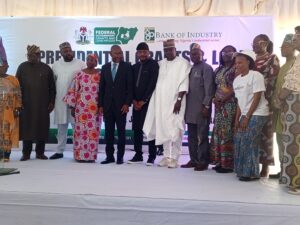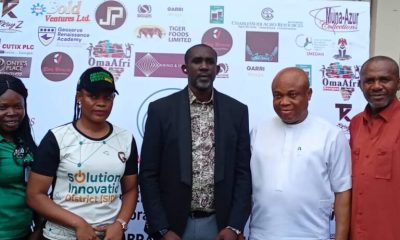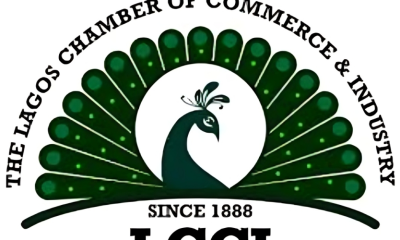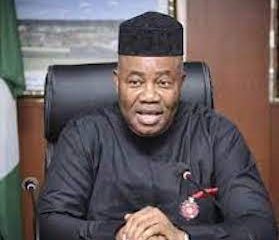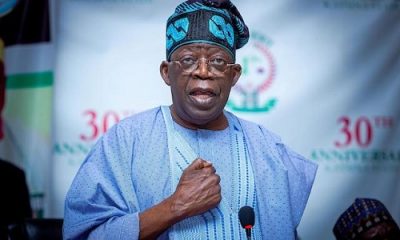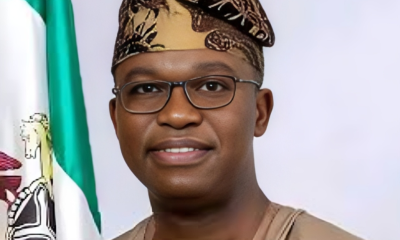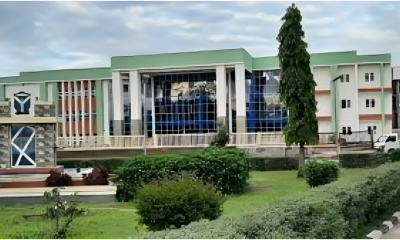BUSINESS
Development Bank of Nigeria Disburses N482bn to MSMEs

By Tony Obiechina, Abuja
The Development Bank of Nigeria Plc (DBN), Nigeria’s primary wholesale development finance institution said it has disbursed a total of N482 billion to Small, and Medium Scale Enterprises (SMEs) since inception.
Managing Director/CEO of the bank, Mr Tony Okpanachi who disclosed this at its AGM at the Transcorp Hilton Hotel, Abuja on Tuesday said 65% of the money was to women and youth-owned businesses.
While presenting the summary of the financial statement for the year ended 31 December 2021 to the Shareholders, the DBN Managing Director informed stakeholders that the fundamentals of the Bank’s financials are robust.
According to him, total Gross Earnings closed at N38.18Billion, Profit Before Tax (PBT) at N22.76Billion representing, an increase of 25 percent from the previous year. Total Assets also increased by 1.4% from N492.3Billion in 2020 to N499.2Billion in 2021.
Okpanachi attributed the Bank’s financial performance to “its robust corporate governance framework, business model as well as its top-notch enterprise risk management coupled with highly committed Board of Directors, Management and Staff, adding that “this is something that I am very proud of”
Continuing, he said, “We continued to focus and deliver on our mandate of providing access to finance through our PFIs to Nigeria’s most critical, but underserved Micro, Small, and Medium Scale Enterprises building their capacity and that of the PFIs in addition to the provision of partial credit guarantee to encourage lending to this very important sub-sector of the economy.
“Our cumulative disbursement of N482Billion especially to women-owned or managed businesses; is something that we are particularly delighted about from the perspective of women empowerment and poverty alleviation,” the MD emphasized.
Okpanachi expressed his gratitude to the Bank’s shareholders, development partners, PFIs, Board of Directors, and employees for their continued support with a promise to continue to remain focused on the Bank’s mandate as well as sustain efforts toward achieving sustainable financing and capacity building for the MSMEs.
Kabir Okunlola, a Partner with KPMG Professional Services, the external auditors of the Bank said that the summary of the financial statement of the bank complied with the relevant statutory requirements.
“In our opinion, the accompanying summary financial information is consistent, in all material respects, with the audited financial statements, and also in compliance with the Companies and Allied Matters Act (CAMA) 2020, as well as the Banks and Other Financial Institutions Act (BOFIA) 2020,” he said.
Economy
Tinubu’s Democracy Speech Reflects Ambitious Vision – LCCI

The Lagos Chamber of Commerce and Industry (LCCI) says President Bola Tinubu’s Democracy Day speech reflects an ambitious and optimistic vision for Nigeria.
In a statement in Lagos on Thursday, the Director-General of LCCI, Dr Chinyere Almona, said the speech showed government’s appreciation of democracy, economic development, security and social cohesion.
Almona said that the President’s focus on economic growth, improving security, and increasing funding for education, healthcare, and infrastructure promised improved economic performance in the near future.
“We join all Nigerians to celebrate the peaceful transition and commitment to democratic values in the past 26 years.
“A stable political environment is very crucial for business success and for attracting investments.
“Government must stay committed to executing all its proposed programmes and ongoing reforms to ensure Nigerians reap the benefits of democracy without further delay,” she said.
The director-general also urged the government to ensure clear and consistent communication about economic reforms and policies to businesses and the general public.
This, she stated, would reduce uncertainty, build confidence and establish transparent mechanisms for tracking and reporting progress made through reforms.
Almona also called for targeted support for businesses to reduce their cost burdens relating to energy, logistics and regulatory compliance.
She said that LCCI recommended non-cash interventions that could ease the harsh production environment.
Almona also advocated expansion of social safety net programmes to support households affected by high living costs and inflation.
She also called for a more collaborative environment among government, businesses, the civil society and labour unions to ensure fair and timely negotiations on wages and working conditions.
She said that the government must implement programmes that would support strategic sectors pivotal to job creation, tax revenues and infrastructure development.
According to her, the oil and gas, power, and agriculture sectors require special attention as they offer catalytic support to the economy.
“As Nigeria reflects on the progress made and the path ahead, we urge government to remain steadfast about implementing all the required reforms toward a more sustainable and resilient economy.
“We call on government to work toward a nation built on the rule of law, justice and social cohesion even in our diversity and political sophistication,” she said. (NAN)
Economy
World Bank Cuts Global Growth Forecast to 2.3% for 2025

Global economic growth is projected to slow to 2.3 per cent in 2025 due to mounting trade tensions and persistent policy uncertainty, according to the World Bank’s latest Global Economic Prospects report.
A statement from the bank’s Online Media Briefing Centre on Tuesday noted that the new forecast was nearly half a percentage point lower than the rate projected at the beginning of the year.
The report indicated that the slowdown would mark the weakest non-recessionary global growth since 2008.
“The turmoil has resulted in growth forecasts being cut in nearly 70 per cent of all economies, across all regions and income groups,” the report states.
In spite of the gloomy outlook, a global recession is not anticipated. However, if current projections hold, average global growth in the first seven years of the 2020s would be the slowest of any decade since the 1960s.
Indermit Gill, the World Bank Group’s Chief Economist and Senior Vice-President for Development Economics, warned of deepening stagnation in the developing world.
“Outside of Asia, the developing world is becoming a development-free zone. It has been advertising itself for more than a decade,” he said.
Gill noted that growth in developing economies had declined steadily, from 6 per cent annually in the 2000s, to 5 per cent in the 2010s, and to under 4 per cent in the 2020s.
This trend mirrored the slowdown in global trade, which fell from an average of 5 per cent in the 2000s to under 3 per cent today. Investment growth had also weakened, while debt had surged to record levels.
The report projected that growth would slow in nearly 60 per cent of developing economies in 2025, averaging 3.8 per cent before a modest rise to 3.9 per cent in 2026 and 2027.
The report added that more than a full percentage point below the average of the 2010s.
“Growth in low-income countries is expected to reach 5.3 per cent in 2025, a 0.4 percentage point downgrade from earlier forecasts.
“Tariff hikes and tight labor markets are expected to keep global inflation elevated, with a projected average of 2.9 per cent in 2025, still above pre-pandemic levels.”
The World Bank warned that slowing growth would hinder efforts by developing economies to create jobs, reduce poverty, and close the income gap with advanced economies.
“Per capita income growth in these economies is forecast at 2.9 per cent in 2025, 1.1 percentage points below the 2000–2019 average.
“Assuming developing countries (excluding China) maintain a GDP growth rate of 4 per cent the forecast for 2027, it would take them about two decades to return to their pre-pandemic growth trajectory.”
Still, the report noted that global growth could rebound more quickly if major economies reduced trade tensions.
It said that resolving current disputes and halving tariffs could boost global growth by 0.2 percentage points over 2025 and 2026.
In response to rising protectionism, the World Bank urged developing economies to diversify trade, pursue strategic partnerships, and engage in regional agreements.
Given constrained public resources and growing development needs, policymakers are encouraged to mobilise domestic revenue, prioritise spending for the most vulnerable, and enhance fiscal management.
To drive sustainable growth, the report emphasised the need to improve business environments, expand productive employment, and align workforce skills with market demands.
Finally, it highlighted the importance of global cooperation in supporting the most vulnerable economies through multilateral initiatives, concessional financing, and targeted relief for countries affected by conflict.(NAN)
Agriculture
Sallah: Ram Traders Lament Rising Preference to Cows

Some ram traders in Lagos State have lamented the preference for cows to rams by Muslim faithful this 2025 Eid Kabir celebration.
The traders disclosed this in interview on Thursday in Lagos.
The traders said that most people prefer to buy cows than rams because of the size and the fact that five families could buy and share for the celebration.
“A ram trader, Mr Ibrahim Hassan, at the Lawanson area of the state, said patronage has been decent, but with an interesting twist.
“The patronage this year is not bad, but I have noticed that people are buying more cows than rams. I believe the reason behind this shift is that cows are more economical and offer better value for money.
“When families or even groups of friends come together, they can share a cow and still fulfil the sacrifice. That way, instead of each person buying a ram for over N500,000, they split the cost.
“The cheapest cow you can get right now is around N800,000, while the cheapest ram starts at about N550,000. Prices also vary depending on the size and weight of the animal.
“I have contacted my sources for more cows, but the market price has gone up since last week. It’s a volatile market, and prices can change quickly,” Hassan said.
Also, Mr Shakiru Gbadamosi, another ram seller at Lawanson, said he noticed that “people are weighing their options this Sallah, and they have been buying more of cows”
“I was surprised to see some buyers turning to cows, and this trend has been on for weeks. Although many still prefer rams for Sallah because it’s about tradition and religious significance.
“The ram is the symbolic animal for the sacrifice, and that’s not something easily replaced.
“Prices have gone up this year, a decent ram now costs between N550,000 and N700,000 depending on the size and breed. But despite that, the demand remains steady.
“Some people have been buying younger rams because they are less expensive but still acceptable.
“The younger rams are sold for between N130,000 and N250,000,” Gbadamosi said.
A buyer, Mr Folajimi Aderibigbe, who confirmed the trend, said buying a cow seems like a better option.
“We are a family of eight, and instead of buying two small rams, we joined with my brother-in-law and bought a cow. It cost us N950,000, but we split it. Everyone still gets to perform their sacrifice and save money.
“Traditionally, rams are the preferred animal for Eid Kabir (Sallah). However, economic realities have changed things, and we must find a way to adapt,” he said.
In a related development, vegetable oil traders said they have observed increased patronage due to the Sallah celebration.
Mrs Linda Nwachukwu, a cooking oil trader at the Lawanson Market, said the demand for cooking oil had increased because of preparations ahead of Sallah.
“The celebration usually increases the demand for groundnut oil. Consumers have been stocking up oil since last week, especially now that there are few days to Sallah.
“Cooking oil prices have risen, but it is cheaper than last December, a 25-litre container cost N110,000, a price that persisted until April 2025.
“A recent price adjustment, just three weeks ago, sets the current rates for groundnut oil at N78,000 for 25 litres, N35,000 for 10 litres, and ₦18,500 for five litres.”
“This is unusual, groundnut oil prices normally surge in December and then decrease by January or February, but it stayed high for a long time,” she said.
Another trader, Mrs Imoleayo Fakunle, said she buys in larger jerrycans and sell in measured portions to customers who cannot afford bigger sizes.
“Not everyone can buy 25 litres or even afford the branded ones, so as a vendor, what I do, is to buy in larger containers and sell in small portions.
“Groundnut oil is expensive, but it is essential. A lot of customers have been buying the measured portions, and they are always happy that they can save money.
“Despite rising prices, customers prioritise the essential ingredient for their celebrations,” she said.
Mrs Taraoluwa Alausa, a consumer at the Idi-Araba Market, said she had learned to prioritize when buying cooking oil since the increase in the price of groundnut oil.
“I purchase measured portions of oil specifically for frying and use a good branded oil for general cooking.
“Lately, I have become more conscious about the type of oil I use. I want something natural and less processed. It’s a bit pricier, but I think it’s good for healthy living.
“However, for this celebration, there is going to be an exception because I will be frying with the measured portions I bought. This way, I can save more and even fry more,” Alausa said. (NAN)



